The shame we carried
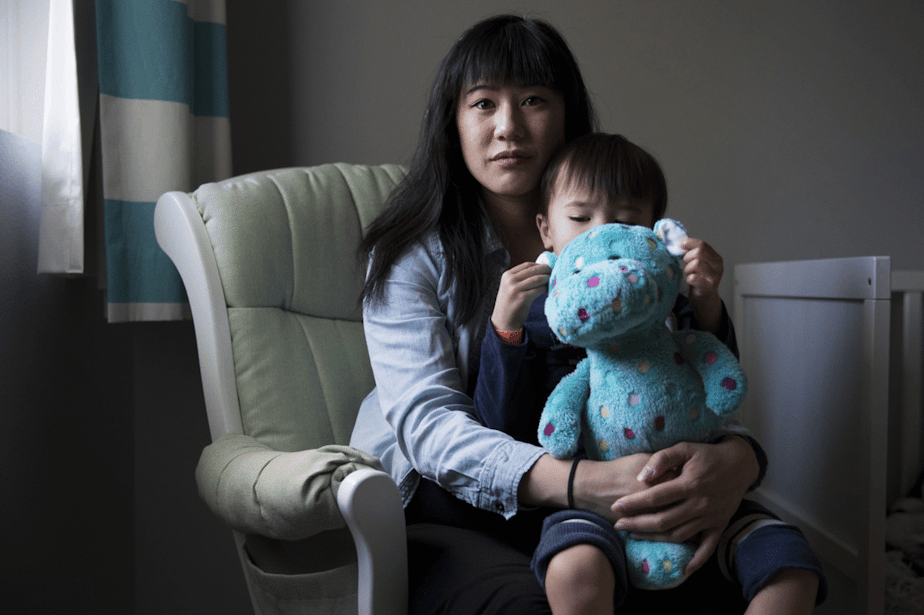
T
hank goodness for Yvonne.
She was the seventh mom I interviewed, with a story as ugly as mine.
Yvonne was 42 when her daughter was born. She had wanted her badly, but soon after her birth, thoughts of unintentionally killing her invaded her brain.
“I had a thing with her neck,” Yvonne said. “I don’t know what it was. It was the most tender part. I pictured her being dropped, or thrown against a wall.”
These were hydra thoughts; if she'd fought them, they would have grown stronger.
Yvonne — not her real name — hadn’t told anyone about this, not even her husband, and by the end of our conversation we were both loopy with relief, saying wildly alarming things like, “I TOTALLY THOUGHT I’D KILL MY BABY THAT WAY TOO.”
Angela King interviews Isolde Raftery about postpartum anxiety.
To be clear: Yvonne and I did not want to kill our babies, and the research shows that women like us don’t act out the thoughts in our head. But we were terrified by the fear that we would.
Yvonne described it as a horror movie playing on a loop in her mind.
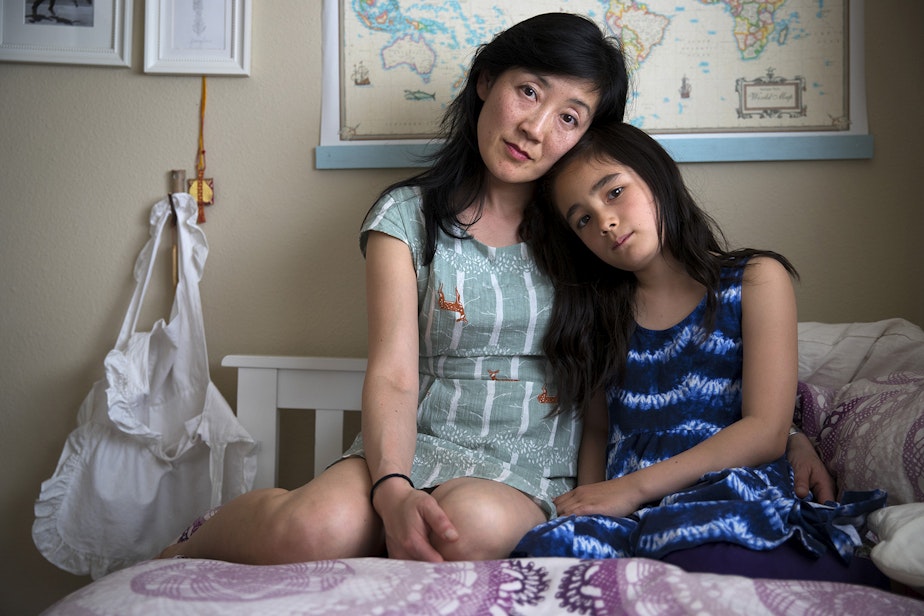
C
onsider our caveman roots, and these thoughts make sense. Mom had to be on guard back then, lest a dingo eat her baby. She had to be alert when the baby crawled toward the river, or vigilant when chopping and cooking near the baby.
Those sharp instincts remain, for most parents at a healthy level, according to Dr. Catherine Davies, a psychiatrist at Swedish Medical Center in Seattle.
But for about 7% to 12% of moms, the volume turns up too high, and those intrusive thoughts become deafening.
The biochemical explanation is that hormones – progesterone and estrogen – plummet after childbirth, Dr. Davies said. Those hormones are psychoactive, meaning that they affect the mind.
Sponsored
"It's probably by design, so that moms will protect their babies," Dr. Davies said.
We don't talk much about postpartum anxiety as a society, which is why so many moms I interviewed said, "Why didn't anyone warn me?" They had heard of postpartum depression, which affects about 9% of moms, but anxiety was a mystery.
Postpartum anxiety has become better known in the last three years, as women share their stories on social media, and psychiatrists identify symptoms.
Some anxious moms feel fine but then have a panic attack at the grocery store, or any time they are away from their baby. Other moms get racing thoughts that prevent them from sleeping or eating.
A smaller percentage of moms get postpartum OCD, like me. I had a moderate form of the illness; disturbing thoughts looped for hours, but I could drive my son to daycare and then drive myself to work, no problem. It just felt like I was living a double life: One in the physical world, and the other in a haunted basement.
Sponsored
W
hen I tell people my story, usually in vino veritas, they blink-blink at me and say, “I’m so sorry you went through that.”
There is silence after this, because my shoulder-angel, who has not been drinking, is whispering fiercely in my ear that I am a jerk for cornering this nice person with my crazy. Stuff it down, she says.
But a few months ago, my boss asked me to report on postpartum anxiety, and its more taxing little cousin, postpartum obsessive compulsive disorder.
I said okay, because I AM FINE NOW, and who better to broadcast this story to the world than a woman who has lived through it? (Shoulder-angel just read this last sentence and had a stroke.)
Sponsored
“You sure?” my boss asked. She must have noticed that my speech sped up to 1.5x. Ohyeah, I said. Youbet.
I interviewed nine women, all of whom said they were talking to me because they don’t want other moms to feel so alone.
Some said they worried about driving across bridges, and that their car, with baby aboard, would plunge into water below.
Jen Apfel, of south Seattle, told me she white-knuckled her drive to the Eastside every morning with her son Max, fearing that an earthquake would take down the I-90 bridge.
“How do I get Max out of his car seat and swim across the lake to the other side?” Jen said she would wonder. “Should I put life jackets in the car? I’m a strong swimmer, but how would I hold a baby and swim?”
Jen worried every day that her son would die of SIDS, or sudden infant death syndrome.
Bathtime was stressful because she worried her son's slippery body would fall ... and that he'd whack his head ... and .... this is where the thought would end.
She wound up in group therapy for people with anxiety. She was the only one with postpartum anxiety.
The young guy leading the group asked them to imagine the worst thing that could happen. He turned to Jen and said, “I’m not going to ask you that.”
“Right,” she said. “The worst thing that can happen is my child dies.”
Taylor Moss, a family therapist who lives in Issaquah, spent two years getting pregnant. When her daughter was born, Taylor feared the people around them.
“I have a beautiful white girl, and she’s going to get kidnapped and used in child pornography," Taylor said she would think.
“I would hook my arms through the stroller so that if the stroller was going anywhere, I would feel it,” Taylor said. “I was always clutching.”
Taylor was vigilant about her daughter to a fault. “It was like there was a tunnel around my eyes,” she said.
It felt like a cruel joke: Why hadn't anyone warned her she would feel this way?
“I texted every woman that I knew who gave birth in the last year and said, ‘What the eff?” she said. “The responses were me too, me too, me too.”
As I interviewed these moms, I heard in their voices how harrowing it had been for them. Even so, I was envious ... they had feared the world outside, whereas I had feared myself.
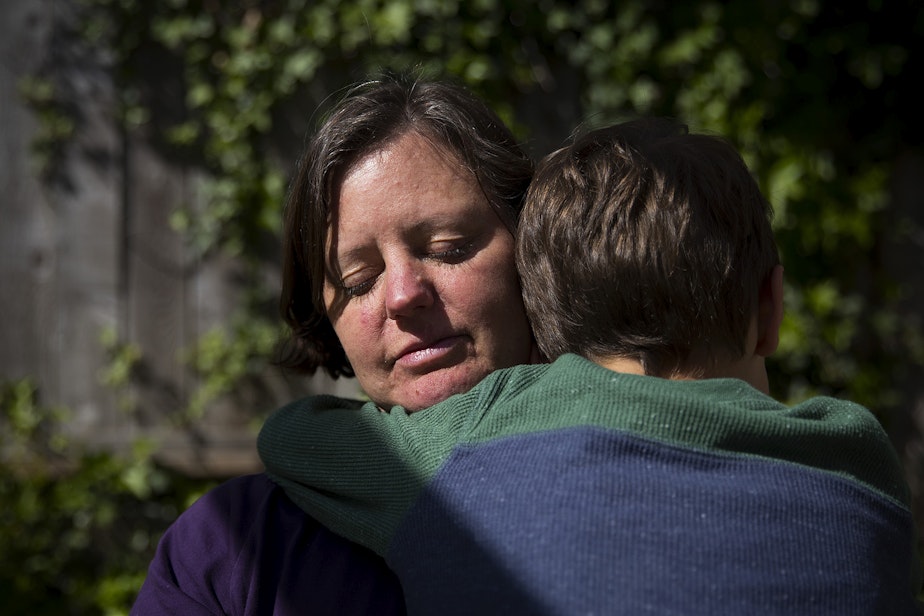
I
n April I met with two psychiatrists who specialize in postpartum mental health, Dr. Catherine Davies and Dr. Veronika Zantop. We met in a tiny audiology booth at Swedish Medical Center.
Davies and Zantop affirmed the research: Moms with postpartum OCD may believe they will harm their children, but they don’t. Zantop said these moms are usually safer than the norm.
They said the moms of concern are those with psychosis. The difference is that moms with OCD find their thoughts troubling, whereas moms with psychosis believe their thoughts are rational, and that killing themselves or their baby would solve a problem.
That’s a fine line, and moms with OCD have been separated from their newborns and hospitalized for admitting to dark thoughts.
“We've had people come through the hospital, who've been hospitalized for postpartum psychosis and (Child Protective Services) has been called, and they had OCD,” Dr. Davies said. “We get very angry when that happens, and upset.”
This misdiagnosis happens because postpartum OCD is a new concept for some psychiatrists, who might worry that these thoughts denote a threat.
I didn’t tell Dr. Davies and Dr. Zantop about my postpartum OCD diagnosis until the end of our interview, after they told me what happens to babies whose moms don’t get help in the first four months.
The mother recovers, they said, but the baby may be affected. “They don't look at their mom as much,” Dr. Davies said. “They're harder to comfort.”
I felt the room close in on me after she said this, and when I listen back to the interview tape, I hear my voice turn cold. I had prided myself on powering through this illness, but really, here was a suggestion that I may have messed up as a mom.
My kid, I should say, is more than fine. He is 5 now, and has an encyclopedic memory for Star Wars. He believes he can cast magic spells, and his preschool teacher says he is like Ferdinand the Bull — big and gorgeous and daydreamy.
But on tough days, because 5 year olds sometimes have those, I can't help but wonder if I'm to blame for wafting my anxiety over him when he was wee.
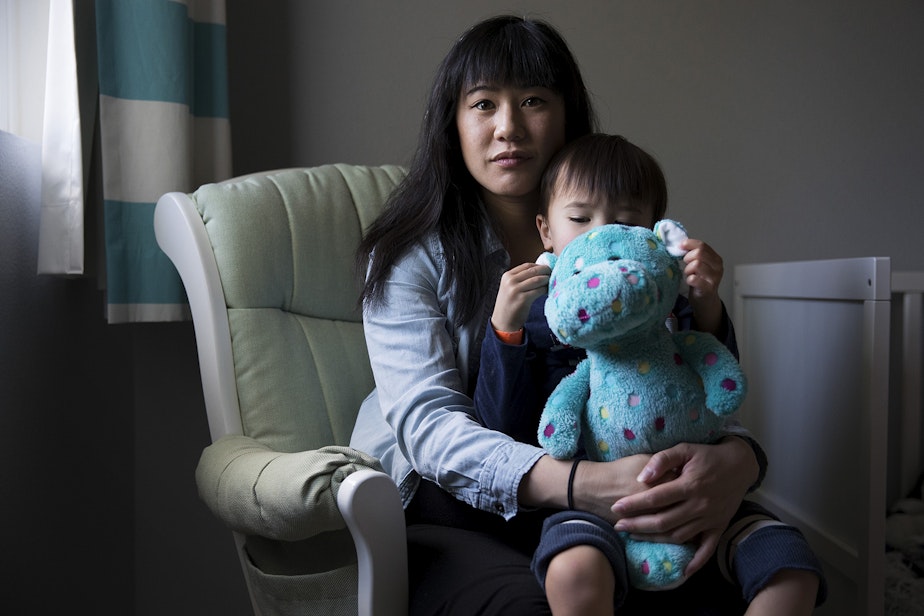
T
hree years ago, Dr. Zantop and Dr. Davies launched a day program for moms who needed therapy more than once a week – moms with anxiety, including OCD, and major depression, or who still hadn’t bonded with their babies after five months. They called it the Swedish Center for Perinatal Bonding and Support Day Program, and it’s covered by insurance.
The women arrive at 9:30 a.m. and stay until 3 p.m. They eat lunch, which is provided, go for a walk, and spend time together in a bright room on the fifth floor with pretty views of downtown Seattle. There’s a fancy breast pump, two white cribs, and diapers at the ready.
About 255 women have been through the program so far; more than half were diagnosed with some form of anxiety.
A through-line is that these women tend to be high-functioning, many of them muckety-mucks in their field. These are professionals who are used to working hard enough, late enough, through-the-weekend enough to succeed. But babies are like honey badgers. They don’t care how hard mom tries.
This came up in my interview with Yvonne, who told me that she worked two jobs as a student at an elite university, and graduated with a 3.97 grade point average.
“I hold myself to a high standard,” Yvonne said. “I’ve always worked, and I’m the breadwinner for my family.”
Anxious moms tend to be self-reliant that way, and the day program honors that. The social workers tend to praise the moms when they’re doing well, to encourage more of that please, but they aren’t prescriptive.
On the day I visited the day program at Swedish, four moms were there. One said she had recurring thoughts of suicide. She teared up. “This saved my life,” she said.
Another mom I’d interviewed previously had talked about suicidal ideation, too. Melody Datz Hansen, a former dance critic, had her baby boy when she was 38. Parenthood came as a shock.
“I never wanted to hurt my child, but I did want to hurt myself,” Melody said. “I would leave the house — I live in Wallingford — in the middle of the night, barefoot, and just walk and think, ‘Can I just step onto the freeway? Can I do this?’”
She said she didn't jump because she was a mom, and her baby needed her.
Back at home, Melody’s husband, a quiet Iowan, would take the baby when she was in crisis. “It freaked him out so much," she said.
At the clinic, I asked Dr. Davies and the social workers if it would be triggering to describe specific intrusive thoughts, like Yvonne’s, Jen's, Melody's, and mine.
On the contrary, they said; I should identify these thoughts, including the vilest ones, so that vulnerable moms reading this know that they are not alone.
So here goes: Some moms, like me, imagine stabbing their babies. Others won’t change their baby’s diaper because they worry they will sexually molest their child. There are moms who believe they will microwave their baby. Or step on their baby. Or pinch their baby’s nose and dip their baby into the bath, head first.
(This illness, man. It’s a ticker tape of red evil that beams the worst taboos into your brain.)
There was no clinic when my son was born, so I DIY’d my own weird intervention.
I stored our knives out of view. I shut myself in the bathroom, terrified that this demon puppet master of a brain would take control of my body and harm the tiny soft creature lying on a quilt in the living room, staring in wonder at a mobile of plush owls.
Love hurts, I told myself, by way of explanation. And this was love in its most concentrated form.
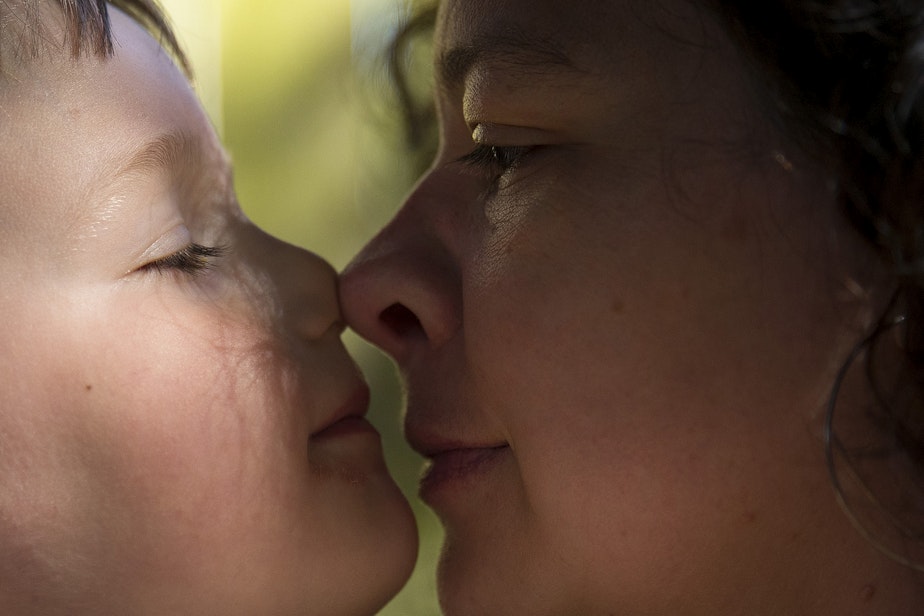
W
hen I saw my obstetrician six weeks after my son was born, a routine visit, she didn’t ask how I was doing emotionally.
Was I nursing? she asked as she sat down on the stool and flipped open her Macbook.
LOOK AT ME, I wanted to yell.
“Are you sleeping?” she asked.
PLEASE. LOOK. AT. ME.
She did, technically, ask: Her medical assistant left a mental health questionnaire on the counter for me to fill out. I left most of it blank.
I walked to the parking garage, waiting for my phone to ring, for a voice on the other end to say, “Excuse me, ma’am, but you didn’t fill out the part where you tell us you believe you will savagely murder your baby and flee to France. Yes box or no box?”
Misa Corso, who lives on Beacon Hill, had a similar experience.
Misa had a joyful pregnancy, and she'd bonded well with her baby after birth, which surprised her. “I don’t really like little kids” she said.
But she couldn't get a grip.
“On the third day, I was really losing it, and I called my therapist,” she said. “I could barely talk on the phone, I could barely breathe. She said, 'I’m coming over.'”
She stopped eating. “I weighed less in the month after she was born than before I got pregnant,” she said.
Five weeks later, she went to see her OBGYN for the routine follow-up visit. She liked her obstetrician but felt that her care was for the sake of the baby.
“I thought I would be taken care of at the OBGYN appointment,” Misa said. “But I wasn’t being taken care of. The baby was being taken care of. I was the vessel. The real patient was the baby.”
“What’s up with these OBs?” I asked Dr. Zantop and Dr. Davies.
Dr. Zantop said that OBs are in a pickle: “I can't tell you how many OBs have said, ‘Well, we just don't screen, because what are we going to do with it? We could ask someone if they're suicidal and send them to the E.R., but otherwise we're like, ‘Oh, sorry you're feeling bad.’”
Having the Swedish day program for these moms has changed how some obstetricians respond, Dr. Zantop said.
Dr. Davies added that it may be hard for obstetricians to know what to ask … or how to listen.
“It's hard to hear somebody have those thoughts,” she said.
M
y eldest son was born the year of Edward Snowden, the guy who revealed the inner working of the National Security Agency (NSA), and I worried that if I Googled my symptoms, the government might get a “bad mom” alert and come get me.
Yeah right, you're thinking, but here's the thing: Had I shared my thoughts with an inexperienced health provider, the state might have been called, and I might have been hospitalized and separated from my newborn — something that happened to other moms in Seattle in 2014, when I had my son, and still happens today.
When my son was eight months old, I ventured online and read a psychiatrist's blog post about intrusive thoughts.
In the comments below it, women wrote that his post had saved their lives. Mine, too, I thought.
For my second son, I was prepared.
I found a therapist, and met with her one week after giving birth.
I told her I felt fine, giddy almost.
Two months later, still fine.
And then at four months, it hit again.
This time, I didn’t worry I would harm my newborn; rather, I was convinced he would get the flu and die.
I made my eldest son wash his hands and change his clothes on the porch when he came home from preschool. I washed my own hands incessantly.
When we hosted my older son’s fourth birthday party, I kept the baby downstairs; after the guests left, I filled a bucket with bleach and warm water and wiped the door knobs and the walls. (Kudos to my paranoid brain, though: No one got sick that winter.)
Most of the moms I interviewed didn’t seek professional care.
Some said a cloud lifted when they finished nursing; others said 18 months seemed to be the moment of change. Some said hearing about the illness, and knowing that they weren't alone, was its own form of therapy.
Some still struggle, years later.
Melody Datz Hansen said she nixed coffee and alcohol, and practices yoga at home with her son.
“I get stuck in my head a lot,” she said. “The way that anxiety manifests is my house is really clean. I’m always caught up on laundry. If those things aren’t in order, I cannot function around the chaos.”
I called Yvonne this week to read her passages from this story.
She blanched when I read the opening lines, where I describe her having thoughts about killing her baby daughter.
She said she'd told her best friend, her husband, and her family that she was in this story, but she didn't go into detail.
"You don't want anyone to go, 'You had those thoughts? Are you fucking crazy?'" she said. "And maybe they might wonder, 'Would you actually think of doing it?'"
Answering this imagined question, she said, "No, no, no, I wouldn't have."
I read her what the psychiatrist and social workers said about including the most taboo thoughts. I read those awful thoughts to her, and she gasped.
“Okay,” she said. “Let’s not sugarcoat it.”
Isolde Raftery is the online managing editor at KUOW Public Radio. She can be reached at iraftery@kuow.org or 206-616-2035.
Resources
Swedish Center for Perinatal Bonding and Support Day Program
206-320-7288
Free peer support line for moms and dads: 1-888-404-7763
Postpartum.net for more information about perinatal mood disorders, specifically postpartum obsessive-compulsive-disorder.
Washington State Health Care Authority
A hotline for health care providers who have a patient with a perinatal mood disorder. Free consultation: 877-PAL4MOM




